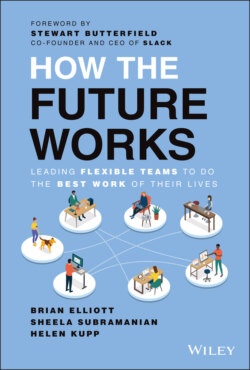Читать книгу How the Future Works - Brian Elliott - Страница 19
At a Glance: The Benefits of Flexible Work
ОглавлениеFlexible work helps companies win the battle for talent, engage employees, and build better results by having a proven positive impact in the areas of:
| Recruiting | Innovation |
| Retention | Customer Engagement |
| Productivity | Diversity |
| Creativity | Your Bottom Line |
One answer is that status quo bias is real, and our default instinct is often to return to old ways of doing things because that's what we know and that's what we're comfortable with.18 After all, that was what got us and our organizations here in the first place. If it was good enough then, why isn't it good enough now? Slack CEO Stewart Butterfield talks about this resistance to change in terms of meetings. Despite the fact that just about every executive he's ever talked to about the subject believes their organization has too many meetings and could gain a lot by being more efficient about how they are structured and run, “They literally do nothing to try to make the improvements because it's not what they're used to and they don't have good ideas about how to get it done.” It's an issue we're tackling at Slack because too many meetings inhibits schedule flexibility, which is central to how we want to work and something we all need to get a lot better at managing.
Another answer is that flexible work models haven't always been successful. While the pandemic accelerated the need for and the adoption of flexible work options, various versions of it existed long before. Pre-pandemic there were a number of high-profile companies that tried it, only to reverse course when a new CEO came on board or they didn't see the results they were looking for. But many of those early attempts failed before new technologies changed the landscape of what's possible. The availability of broadband connection, SaaS tools, and the consumerization of IT have made things possible that simply weren't before, and the pandemic sped up advancements even further.
One of the biggest reasons why flexible work hasn't always worked in the past, and can still fail today, is because companies don't always get it right. They often fail on two fronts:
The What: Too many people don't fully understand what flexible work could or should mean for them, particularly the crucial importance of schedule flexibility.
The How: Too many people don't understand how to execute it successfully.
This book is going to show you how to do both.…
